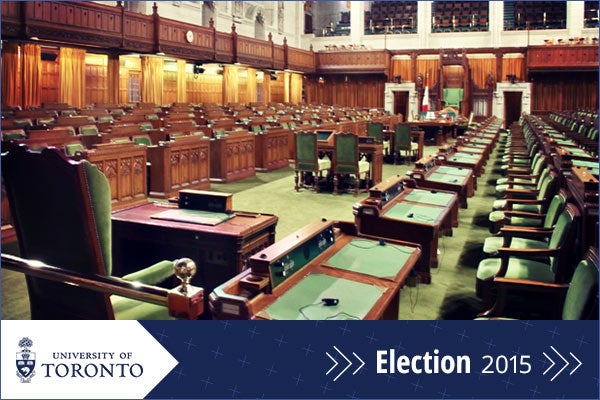
Election 2015: what happens if nobody wins a clear majority?
Published: October 13, 2015
With public opinion polls pointing to a possible minority government after the federal election, Professor Peter Loewen has outlined some of the scenarios that could follow, and the role of the Governor General.
In the weeks leading up to the election, U of T News has been asking experts from across the university for their analysis of the major issues, the debates, political advertising and public opinion polling and more. Recent features have shared campaign analysis in statistics, economics, marketing, law and other disciplines.
Read more Election 2015 coverage
Loewen, an associate professor of political science, spoke with writer Alan Christie about the election and the procedures followed after all the votes are cast.
Will more people vote in this election, given the apparent mood for change and the well-publicized campaign to get young people to cast ballots on Oct. 19?
If I had to hazard an estimate, I’d say that turnout will be within two points of where it was last time, either above or below. (In the federal election of 2011, 61.1 per cent of eligible voters cast ballots).
It’s very hard to get young people to vote, so I don’t think we should expect a large change (about one-third of those 18-24 voted in 2011).
There are 338 seats up for grabs in this election up from 308 in the last House of Commons. Does redistribution favour the governing party? Has it addressed some of the inequities with regard to rural ridings and urban ridings?
With the exception of one seat in Quebec, the remainder of seats have been added to largely suburban ridings in Ontario, Alberta, and B.C. This is probably to the advantage of the Conservative Party, on balance. That said, this has not done much to address the very large disparity in populations between rural and urban ridings.
It is important for Canadians to know that our riding populations vary by a very large amount. Constituency populations vary by as much as 25 per cent above or below the average constituency population in a respective province. In practical terms, this means that some constituencies in a province might have 125,000 voters while another has 75,000. This really affects voting power, and it is not really addressed by these reforms.
What happens if no party gets a majority – 170 seats? What is the process used to form a new government? Can you explain the role of the Governor General in this process?
This is actually not an entirely clear answer to this, but the basic set of moves is the following. The Prime Minister has the first opportunity to try to form a government, regardless of whether he has won the most seats or not. That said, Prime Minister Harper has indicated that if he is not leading the seat count then he will not attempt to form a government. If he is first, he will attempt to pass a Speech from the Throne. This will be put to a vote by the House of Commons.
The opposition parties can respond in several ways. They can let the Speech pass. At that point, Harper is largely in the clear. Second, they can vote the Speech down. If they do this, they have three broad options.
First, they can form a coalition in which they would share cabinet seats and jointly govern.
Second, one of those parties – likely the one with the most seats – can form the government with support from the other according to a formal agreement. Such an agreement would spell out which policies the government would pass.
Third, one of the parties can attempt to govern with case-by-case support from one of the opposition parties. As for the Governor General, I think his role is less clear than political scientists and constitutional experts like to pretend. In short, his job is to judge whether a government has sufficient support to govern, and if not, to identify which party or parties might be able to govern. How he decides to do this and when he will do it after the election is largely at his discretion.
If the Tories can pass a Throne Speech then they have a case for an election if they are later defeated. But if the Throne Speech fails, then the Governor General will assess whether an alternative formation has a chance of succeeding.
There have been quite a few minority governments in Canadian history, including ones led by Stephen Harper, Paul Martin, Pierre Trudeau, Lester Pearson and John Diefenbaker. How effective can they be?
I think the evidence is that a lot can be done. We should not be worried about minority governments. In general terms, I think we have a very robust political system. It can survive whatever government form or Prime Minister emerges.

